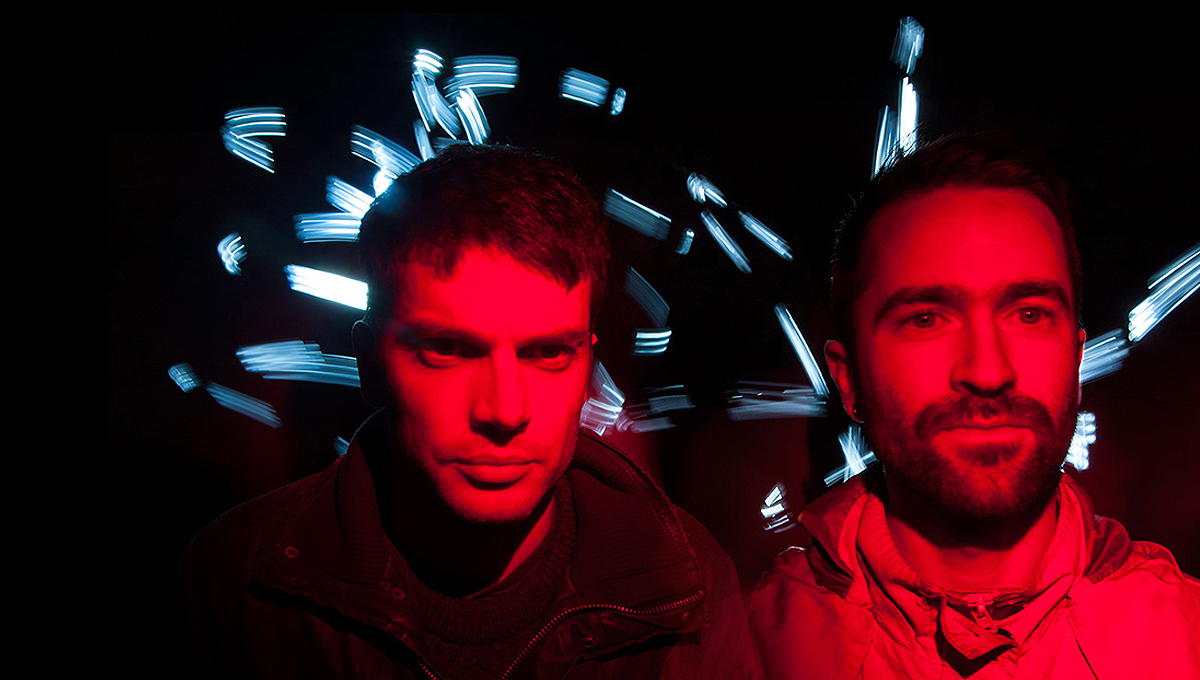Two Irish stalwarts of Techno culture, Lakker have just released their latest album on R&S Records. And supporting the mantra that “Techno is an ideology”, Struggle & Emerge LP is from the ground upwards, a conceptual piece.
Ian McDonnell and Dara Smith both make up Lakker, an Irish born techno partnership whose longstanding collaborative project has seen releases on Blueprint, Stroboscopic Artefacts and R&S Records. On the latter, the pair have recently released their latest project, a conceptual album based around the Dutch and water – called Struggle & Emerge. These themes we’d later come to discuss.
“As you grow up you get to know more about what you like as a person and as as individual” – Dara
Connecting with the boys over a Skype connection (Ian in Dublin, Dara in Berlin) they seem to relax into the conversation pretty quickly. I sense this is because for the greater part of their working relationship, this is how they’ve communicated. “We work a lot across the web. When we do anything big, like an album, we meet up in a studio and put the finishing touches on, but even when we lived in the same city in Dublin, we worked like this (remotely)”.
The past two years have seen the pair gigging a lot more, and along with the birth of Dara’s new daughter, they’ve had to take things more seriously. But during their formative years, they both took a couple of years out to go travelling. “Irish people tend to travel a lot”. Having backpacked for roughly the same period of time myself, I couldn’t resist probing a little further. [Dara] “I think musically, it’s a good thing to do…. It’s nice to step away from it all….. take some space, and come back re-energized”. [Ian] “It broadens your horizons, puts you in unfamiliar situations where you need to act differently to how you do in normal everyday life and you learn a lot about yourself and the world around you….as an artist it’s important to have interesting life experiences that you can channel back into whatever it is that you do”. They came back, and then wrote a manifesto. Images conjure in my mind of Newtons’ Quæstiones quædam Philosophiæ.
“I still find a lot of techno can be boring” – Dara
With the manifesto, focus was one of the key things. [Dara] “We were very kind of magpie-ish – in terms of ‘ooooo there’s a new shiny thing, and we wrote a lot music styles (in this fashion)'”. Another thing the pair arrived at was “less is more, which a lot of people arrive at, after years of making music [Ian tells me]. “And as you grow up you get to know more of what you like as a person”. The pair share some rather meaningful sentiments: the coming of age, self-discovery and identity.
We move on to DJing, and Dara seems to take gratitude in the subject. “It’s like fun homework. It’s good to keep up with the latest music. And it’s very easy not to do that, and remember the music from the golden age. Well, maybe music back then wasn’t better, you just haven’t kept up [laughs]”. To them, DJing seems to lie at the heart of their ability to refine their sound. They make music that they’d want to hear coming out of high-intensity loudspeakers, and this is a philosophy that seems rooted at the core.
“The tag of Berlin – it’s very easy to get sucked into that….. We just want to keep doing our own thing.” – Ian
The pair recently moved to Berlin, and I wanted to move the subject onto this, as they have expressed interesting viewpoints on the city in the past. The music video of their 2015 release Three Songs, actually taking a satirical tongue and cheek approach on an all too often conservative culture. [Dara] “There’s this closed mindset, and a pressure to conform in certain nightclubs, to a certain culture, and dress a certain way [not naming any nightclubs – laughs]. And if you let this influence you too much, it can be slightly restrictive”. Ian joins in with a rather subdued tone – “there can be quite a greyness to certain aspects of the Berlin scene, and for all its open-mindedness, it still has this strange kind of conservatism, and anything can become conservative if it has to meet a certain norm, and it’s this dark aesthetic that has become the norm”. Ian explains to me that they didn’t want their sound to become too Berlin, just because they moved to Berlin. Dara affirming this sentiment – “It’s funny, it’s like this thing people write after their name….. the tag of Berlin, it’s very easy to get sucked in, within the Techno scene. It’s this tag that we tried to not get sucked into”. But Berlin was a new city for them both, and for the first time, they were now living together, spending time in the studio together, and this would lead onto them creating their breakthrough album – Tundra.
“When it’s done well it can be really beautiful, but when it’s not it can be really boring.” – Ian
With the surge in popularity around techno, I ask Ian his thoughts on the subject, and to this he seems to bare much opinion. Because to him, clubs like Berghain have created this ‘Mythological’ identity around the genre. It’s become a lifestyle, and a global phenomenon. But Ian sees this as a double edged sword. “There’re so many new producers, and good Techno coming out at the moment, but there’s so much Techno that for me I find really dull as well. And it’s become completely saturated”. But Dara (who during our converation, I noticed to be the more optimistic of the two) ruminates on the benefits of all this, with trends encouraging the ability for genres to mutate, creating interesting sub-genres.
And for the most concerned of artists, trends and fads lack taste or substance. Something Grayson Perry talks at large about in his lectures. And in our conversation, the pair bare a similar disdain. Ian elaborates: “Techno is far more than a trend. While there’s trends within Techno, for most it’s a lifestyle, and an ideology. It’s an idea. We fold on Jeff Mills as a prime example to someone purveying this notion.
“There can be quite a greyness to certain aspects of the Berlin scene…. It still has this strange type of conservatism….It just becomes boring after a while.”
And you can see that ideas are a formative principle for Lakker’s approach to creating music. With their forthcoming album Struggle & Emerge, releasing 13th May on R&S Records, this conceptual album is as much about ideas, as it is brooding music. As one of the first artists to enroll in the Revive initiative (which aims to bring together the worlds of archives and music) Lakker drew upon the inspiring relationship that the Netherlands have with the sea. With half the country below sea level, Dutch engineers have had to devise unimaginable technological feats to preserve their heritage and population. Building towering dams that stretch over 19 miles long, they’ve managed to control the sea, albeit a few historical catastrophes. Using samples from the 1953 radio report – where over 1500 people died in a flood, after Holland’s flood defenses caved in, Dara explains how “the visuals inspired the sound”. The pair visited Holland during this project, and at the Beeldengeluid (Netherlands Institute for Sound and Vision) where 11.5 Petabytes of archive footage lay at their disposal, the pair had to devise a method of working through this. [Dara] “So I watched all the video files, stripped out the audio, and gave that to Ian”. Dara could then focus on context while Ian works on the raw sounds, to give them two perspectives. [Dara] “It’s kind of like peeling back layers of history” and this concept is quite interesting, because whereas producers are always trying to produce innovative new sounds that are forward thinking and new, the pair are essentially looking to the past.
“You spend so much time in front of a screen, that you don’t want to turn it off. it’s addictive” – Ian
And Lakker also relish in the human aspect of this project, looking at the stories of people whom they’d researched. Because in Holland, there is a real optimism in the cultures approach to their suspended fatality. Whilst Ian and Dara take a rather dystopian frame, when looking in on it as outsiders, for the residents, they just get on with life as normal. [Dara] “I think you find that in cultures all over the world… like people living beside a volcano…. people who live in all sorts of crazy places, they emerge and adapt.. they keep going”. And this is where the name Struggle & Emerge came from.
“Nobody owns any form of music, and there’s no need to be precious about it…. there’s no need to be overly serious about it…..at the end of the day we always go back to, what would we like to hear coming out of the speakers, what’s inspiring to us.” – Ian
As we start to draw the conversation to a close the topic of technology detoxes comes up. [Ian] “You spend so much time in front of a screen that you don’t want to turn it off. It’s addictive”. Reading a feature recently in ID magazine about this concept of social media taking over our lives, the key principle we all seem to share in the conversation was balance. But for all this, the boys still manage their own social media accounts. Good on them!

